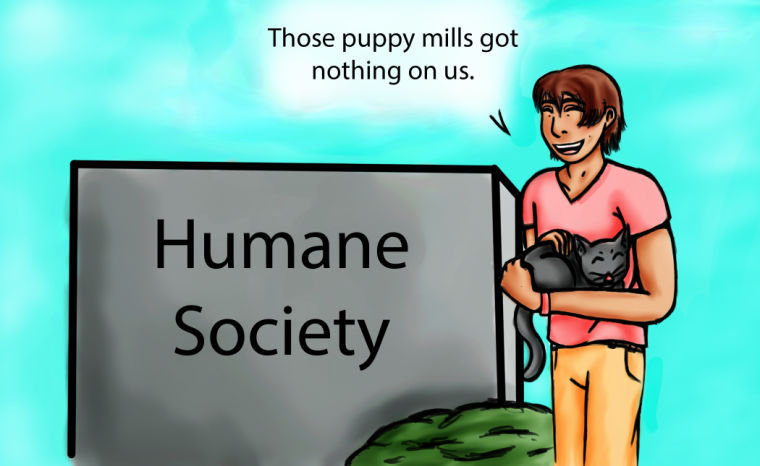More than just a business
October 21, 2013
Puppies, kittens and birds for sale, batteries not included.
Many of us welcome companion animals into our homes as members of our family. Nearly 68 percent of households within the United States own a pet. Last year spending on pets totaled $53.33 billion, a 4.7 percent increase from the previous year, according to a survey conducted by the American Pet Products Association.
As the popularity of companion animals increases, a darker side of the pet industry also gains momentum. Hidden away from the consumer eye, pet production lines are experiencing a boom as the demand for pets grows. We would do well to avoid contributing to this inhumane industry.
Pet mills mass produce companion animals for commercial purchase. Usually, these facilities are run with money in mind rather than the welfare of the animals they produce. These factory-like facilities are maintained in poor and inhumane conditions, somewhat akin to a medieval dungeon, according to the Humane Society.
Such a dreadful environment provides little in regards to the wellbeing of the animal. Mills often cram many animals into small, feces laden confines, creating a breeding ground for all kinds of infections and parasites. Animals within such facilities do not receive proper veterinary care or adequate amounts of food, according to the Humane Society.
Kitten, puppy and parrot mills all cater to a growing market: the companion animal industry. They supply retail stores with pets that can be sold at reduced prices; however, they do so at the expense of the animal. Ignorant pet store consumers end up short-changing themselves by purchasing an animal mill pet with pre-existing, and potentially life shortening, health problems.
Furthermore, animals produced in these environments often lack proper socialization, according to the American Society for the Prevention of Cruelty to Animals. Puppy mill dogs, for example, may be jumpy and fearful. Other animals, such parrots or other birds, may exhibit similar behavioral problems. These often lifelong problems are not exactly what most people are looking for in their search for the perfect pet.
The commoditization of companion animals provides little benefit to the consumer or the animals involved in the production line. While retail pet stores may sell animals at a more alluring price, they disregard the ethical implications involved in such a business. By compromising the health of a living creature, they cheapen its value and disregard the spirit of what it means to care for a pet.
Individuals interested in adopting an animal into their home should look toward animal shelters or to responsible breeders who care about the wellbeing of their animals. By purchasing a pet from a place that puts the welfare of the critter in high regard, consumers make the more ethically-minded choice by helping reduce the demand for ‘factory’ produced pets.
Retail stores should pay closer attention to the origin of the animals they sell to avoid short-selling their customers on what may be many years of joy and companionship.
Once a companion pet finds a home, it often remains there for many years as a part of the family. It is the responsibility of retailers, breeders and pet-lovers to ensure that every companion animal on sale is cared for every step of the way. We derive so much happiness from our pets. It’s the least we can do.
-Michelle Chan is a sophomore animal science major from Phoenix, Ariz. She can be contacted at 335-2290 or by [email protected]. The opinions expressed in this column are not necessarily those of the staff of The Daily Evergreen or those of Student Publications.






















